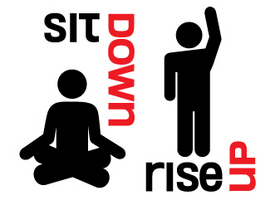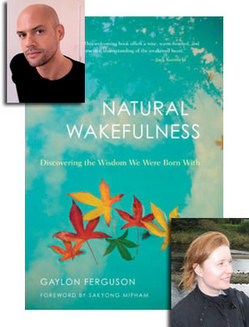by Paul Griffin
In Buddhism, the three avenues to understanding are study, reflection, and meditation. To study is to listen to the teachings and to read the texts. To reflect is to think about the material and to make it your own. In this DharmaWorm blog series, I want to discuss what I’m currently reading. A quick search on Amazon.com for “dharma” books yields 21,717 options, while a search for “Buddhism” calls up 80,636 books (a search for “meditation” connects you to a mind-numbing 251,665 books–a quarter of a million books on meditation!). In other words, the sea of dharma books in our culture is deep and treacherous. I want to be a tenacious and steadfast swimmer of this sea–I’d like one day to reach the other side.
Lastly, I’d like to note that the idea of this series is not to indulge in the marketplace of dharma, not to flit about from idea to idea searching for my foundation (full disclosure: I already have my teacher, Reggie Ray, and I highly recommend all his books, particularly Indestructible Truth). Rather, my purpose in this series is to take the evolution of Buddhism in the West seriously, as a scholar and a devoted practitioner, and to try to bring insight and clarity to the myriad of discourses that any good book gives rise to.
BOOK OR AUTHORS DISCUSSED OR MENTIONED
Buddhism Without Beliefs, by Stephen Batchelor
“A Critique of ‘Buddhism Without Beliefs’ by Stephen Batchelor,” by Bhikkhu Punnadhammo (an online essay; link provided)
The Best Guide To Eastern Philosophy and Religion, Diane Morgan
Natural Wakefulness, by Gaylon Ferguson
NEW BOOK BOUGHT BY, ORDERED BY, OR GIFTED TO ME
Zen Bones Zen Flesh: A Collection of Zen and Pre-Zen Writings, compiled by Paul Reps and Nyogen Sensaki
…
First, I’d like to thank last week’s commenters. I really do want to make this DharmaWorm series a dynamic space for actual conversation, even if that conversation is painstakingly slow and patient and completely nerdy. In that spirit, @Anan E. Maus, as you see, I’ve ordered the classic Zen Bones Zen Flesh, and I look forward to a discussion about some of its contents soon. @Greg, I found the link you posted to Bhikkhu Punnadhammo’s critical essay on the Batchlelor quite helpful. I’d like to discuss some of Punnadhammo’s points in today’s post.
For example, I agree with Punnadhammo that a prominent problem with Batchelor’s approach is his veiled “belief” in scientific materialism…
In short, I find the West’s predominant and largely unexamined acceptance of the scientific materialist view–that is, that space and matter are composed of atoms and molecules, that there is no other explanation, and that there is nothing else beyond the material world, no so-called spiritual world, nothing that we cannot see–a terrible hindrance. In short, a wrong view. On this point, Punnadhammo keenly points out a sentence in the Batchelor that caught my attention too:
“All this has nothing to do with the compatibility (or
otherwise) of Buddhism and modern science. It is odd that a practice
concerned with anguish and the ending of anguish should be obliged to
accept ancient Indian metaphysical theories and thus accept as an article of faith that consciousness cannot be explained in terms of brain
function.” (Batchelor, page 37)
Punnadhammo rightly points out that in this statement, “Whereas [Batchelor] would have us belie[ve] that he is taking the position of ‘I don’t
know’ he betrays a decided bias at every turn for materialism.” Punnadhammo continues, claiming, “Consciousness has
not at all been explained “in terms of brain function” by modern science
or by anyone else. It is entirely a metaphysical assumption that it ever
can be.” As I read it, in his veiled or not-so-veiled materialism, Batchelor is assuming a position that loses track of, in his own words, “the ambiguous logic of both/and.” Isn’t this the logic that underpins the whole form & emptiness paradox? That is my understanding. But as I read Batchelor, it seems he has been, again in his own words, “tricked by either/or logic.”
Meanwhile, I would challenge any staunch scientific materialist to just try and observe a microscopic particle. As quantum physics explains, the whole effort to do so is a real Now you see it, now you don’t! phenomenon. It’s a matter of probabilities. So, while I agree that consciousness can be explained by “brain function” to a degree, that’s simply not the whole story.
That’s just one point. And while I could go on, I am going to curtail my discussion of Punnadhammo’s criticism here, because, frankly, Punnadhammo has already made an excellent and extensive critique–if you want to know more, read his essay. He criticizes Batchelor’s view on many more fronts, including: Batchelor’s “trivialization of
the Buddha’s enlightenment;” his failure to see that “karma is central to the very
definition of Right View;” his “imbalance” between faith or confidence and discriminating reason; etc.
But what I can add to the conversation is the sense of my own personal desire to align myself with Batchelor’s views. Meaning, I want a modern, reconciled Buddhism. I want a more empirically sound faith. Deep within, I do indeed find a desire to reconcile certain aspects of my Buddhist faith–say, my view of karma as moral law; or my understanding of the absolute realm; or my sense of shunyata–with my rational scientific mind. What I find interesting in reading Batchelor is how it plays with my balance of faith and reason, how it tries to seduce my discriminating mind into taking a place of dominance, how it tries again and again to pull me back into a resolutely Platonic worldview wherein reason alone is king. But then I practice, I sit, I meditate. And, as always, I come back to a more embodied sense of the teachings, and the dharma again begins to work its strange magic on my sensibilities.
I suppose that’s enough for today. I want to work on keeping my posts short(er) and readable. But I do want to mention one last thing about Diane Morgan’s The Best Guide To Buddhist Philosophy and Religion. I’ve realized that my only real problem with this text is its immense ambition. The dharma is so incredibly precious to me. And complex. So when I see my student memorizing a stiff textbook definition of “the dharma,” I cringe. But such is the way sometimes, right? There are thousands upon thousands of gates, yes?
Lastly, in her (excruciatingly) brief discussion of Chogyam Trungpa, Morgan says that Trungpa’s car crash is what led him to become a lay person, marry, and drink a lot of alcohol. Can anybody else confirm the degree to which the car crash was in fact so influential? Just wondering…
Next week, Ferguson’s Natural Wakefulness! Thanks for reading.

